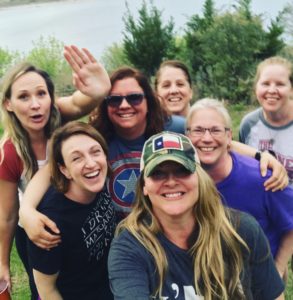Social Connection Builds Resilience
Social Connection Builds Resilience
Social Connection Builds Resilience
Humans are social creatures with emotional needs for relationships and positive connections to others. Our social brain craves companionship. We are not meant to survive, let alone thrive, in isolation.
I am so grateful for my tribe. I have some amazing friends and I’m not sure how I would have survived this far without them. These are the people I call when I feel broken. These are the shoulders I cry on. These are my friends who catch me when I fall (and then laugh at me hysterically).
Every April (except this one thanks to COVID), my best girlfriends and I take a camping trip. It is a weekend that I look forward to for months and one of my personal resilience-building strategies.
Different friends ebb and flow through the course of your life, but if you are lucky enough, you will have a lifelong tribe who loves you to your core.
It has been proven that social connection is one of the best predictors of longevity, so in a time where it is so easy to slip into social isolation, here are 4 ways to stay tight with your tribe:
 #1 – Know Your Why
#1 – Know Your Why
I watched a great video recently from Simon Sinek (still can’t believe I got to share a page with him in SUCCESS Magazine) about Why We Form Tribes. He said that we form tribes and connections around a common vision or shared values. We trust the people we’re in the tribe with for better or worse. So, ideally, you want a tribe to form around vision and value.
We are all going through the shared experience of the COVID-19 pandemic, and when you are anxious or feeling down, it is much easier to isolate yourself. Resist the urge to withdraw and make an effort to stay connected to the people in your life that matter most – at an appropriate social distance, of course.
#2 – You Are Not Alone
Social connection and community drive resilience. Like optimism and gratitude, the happiness boost you get from connection with others is crucial to your health and well-being and a key element to building resilience. Having friendships and a sense of belonging is considered a core psychological need and has a big impact on our physical health. One study found that loneliness is toxic. In fact, it’s more harmful to health than obesity, smoking and high blood pressure.
The number of friends you have isn’t as important as the quality of those friendships. Social connection doesn’t mean you have to be an extrovert. It is simply acknowledging that we need each other.
#3 – Seek Support
According to Sinek, we seek out people who have shared experiences because we feel safer in those tribes. Support groups have been one of the ways I have been able to survive this journey with my son, Evan. I credit my support group and my teachers at NAMI (National Alliance on Mental Illness) for helping me survive some of my roughest times. Studies have found that meeting other people who are further along in the same journey helps you to overcome permanence by showing you that you won’t be stuck where you are forever.
Support groups connect you with others who really get what you’re going through and provide human connection. The club that no one wants to be a part of provides incredible bonding. Shared hardships actually make us release oxytocin, the feel-good hormone, and creates common understanding.
#4 – Show Some Love
Take time to connect with the people in your life. Send a text right now to someone. Something as simple as, “I was just thinking about you” can be the little boost that person needs. The added bonus is that you feel good in the process. And, while we all like friends that are sweet and loving, we also need the ones that don’t bullsh*t us, pull any punches, and will hold our feet to the fire. This week, post a photo of you and your tribe on Facebook or Instagram and tag us @AnneGradyGroup!
Our new “normal” has flipped the way we connect upside down, but it hasn’t changed the need to connect. Surround yourself with people who lift you up, celebrate, and laugh with you.
Stay brave and resilient,
Anne
Subscribe to Anne's #RoutineResilience Email!
Anne breaks down the daily habits and skills needed to grow and cultivate RESILIENCE.
We can take back control of our energy, but FIRST, we have to be aware that we are running on fumes. Here are five subtle signs to look for before you burn out:
1️⃣ You Feel Snappy, Judgy, or Overly Critical (Even Over Dumb Stuff)
2️⃣ You’re Drowning in Decision Fatigue
3️⃣ You Feel Guilty for Resting (So You Never Fully Do)
4️⃣ You’re Scrolling to Numb, Not Connect
5️⃣ You Keep Thinking: ‘Once I get through this week…’
If even one of these sounded familiar, that’s your sign. You don’t need to wait for burnout to make a change. This is your permission slip to pause, reset, and breathe. 🎥
Have you ever had to schmooze at a networking event? You find yourself in some awkward situation, fumbling around for the right words when you land on “How are you?” or “What do you do?” Two of the most boring, uninspiring, uninteresting questions in the world.
Fortunately, there is a conversation starter that works better, is way more interesting, and makes you more memorable. This question is so powerful that it activates the pleasure center of the brain.
Here’s the question: “Working on anything exciting lately?”
That simple conversation starter makes people light up and feel good. And the best part? When they leave the conversation, they connect you with that good feeling.
If you want more tips, tools, and strategies like this one, sign up for my weekly Resilience Reset newsletter! ⬇️ https://www.annegradygroup.com/strong/
A couple of fun facts about gratitude:
🙏 Just looking for something to be grateful for drops cortisol by 23%.
🙏 A gratitude practice trains your brain to search for and find more good stuff.
🙏 Gratitude improves mood, memory, focus, immune function, and heart health.
What will you look for this week? #mindfulmonday

Anne Grady is a Speaker, Author, and #TruthBomb Dropper.
Anne shares practical strategies that can be applied both personally and professionally to improve relationships, navigate change, and triumph over adversity. And she’ll make you laugh while she does it. Anne is a two time TEDx speaker, and her work has been featured in numerous media outlets, including Harvard Business Review, Entrepreneur, Forbes, Fast Company and Inc. magazines, CNN, ESPN, and FOX Business. She is the best selling author of 52 Strategies for Life, Love & Work and Strong Enough: Choosing Courage, Resilience and Triumph.



1 Comment